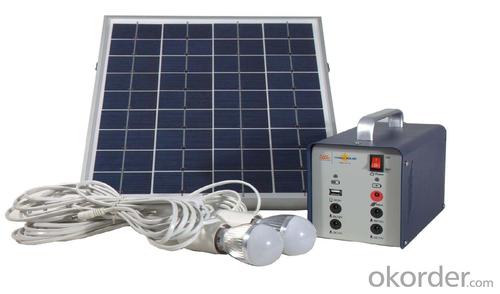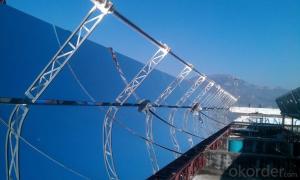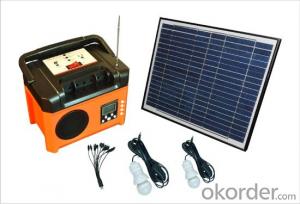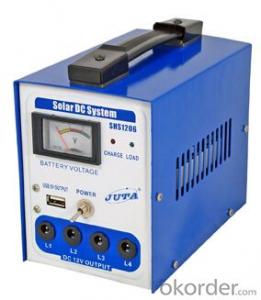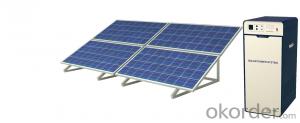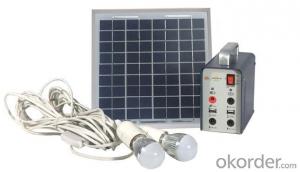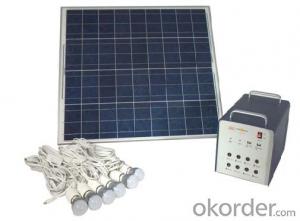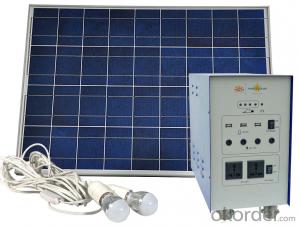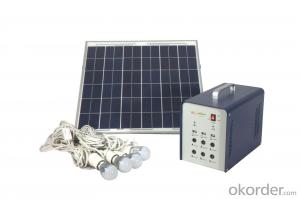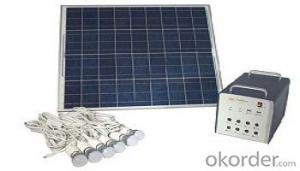Solar Energy Systems Limited Home Off-Grid Solar Power System DC Lighting JS-SPS-15
- Loading Port:
- Tianjin
- Payment Terms:
- TT OR LC
- Min Order Qty:
- 10 set
- Supply Capability:
- 10000 set/month
OKorder Service Pledge
Quality Product, Order Online Tracking, Timely Delivery
OKorder Financial Service
Credit Rating, Credit Services, Credit Purchasing
You Might Also Like
Off-grid Solar Power System
General Introduction
Solar power system provides alternating current and direct current, which is produced by the modules transforming solar power into power, to home lighting, household appliance and other DC appliance, such as cell phone and laptop.
Solar power system is widely used in area lack of power, for example house power supplying, monitoring, communication base, fire prevention in forest area, pasture and meadow, aquaculture etc.
We are dedicated to provide high quality off-grid PV products and systems to customers and has received a series of certificate, including ISO9001, TUV, UL, CE, CQC and RoHS.
Solar DC Lighting System
Multiple protection system, safe and reliable performance.
Integrated and portable design, easy operation.
DC5V, DC12V, AC220V output, wide range application.
Clean engergy, cycle use.
General Introduction
Solar power system provides alternating current and direct current, which is produced by the modules transforming solar power into power, to home lighting, household appliance and other DC appliance, such as cell phone and laptop.
Solar power system is widely used in area lack of power, for example house power supplying, monitoring, communication base, fire prevention in forest area, pasture and meadow, aquaculture etc.
We are dedicated to provide high quality off-grid PV products and systems to customers and has received a series of certificate, including ISO9001, TUV, UL, CE, CQC and RoHS.
Solar DC Lighting System
Multiple protection system, safe and reliable performance.
Integrated and portable design, easy operation.
DC5V, DC12V, AC220V output, wide range application.
Clean engergy, cycle use.
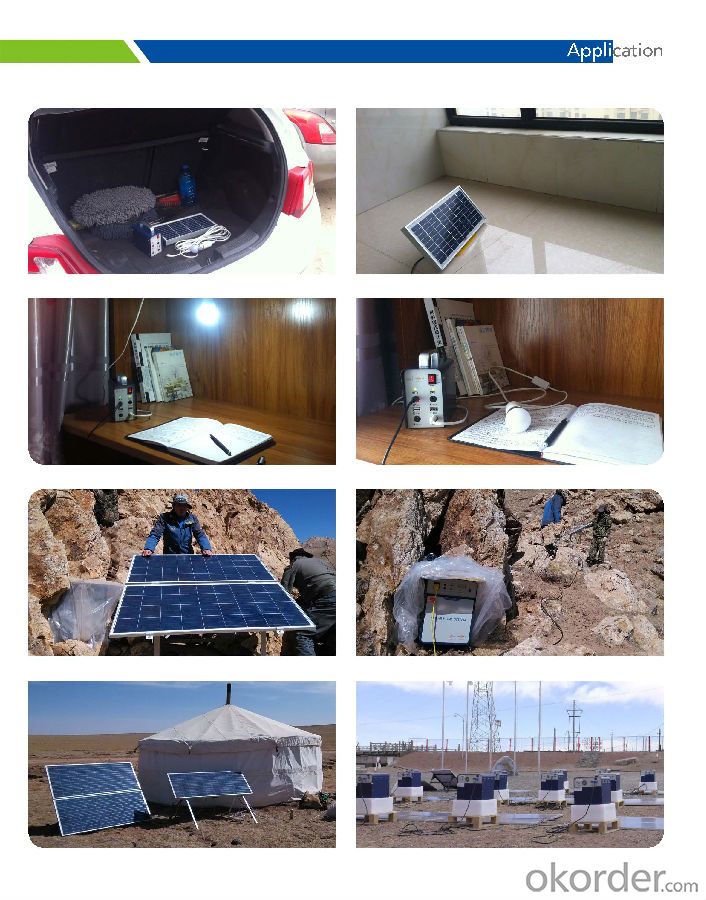
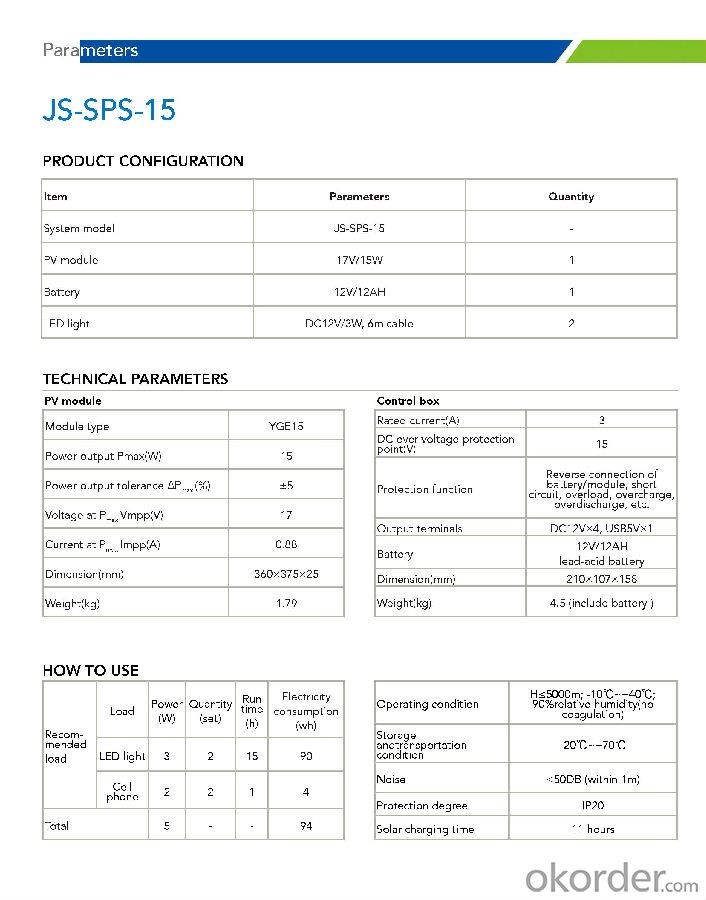

- Q: How do solar energy systems affect job growth in the renewable energy sector?
- Solar energy systems have a positive impact on job growth in the renewable energy sector. The installation, maintenance, and manufacturing of solar panels create a significant number of employment opportunities. Additionally, as the demand for solar energy increases, more jobs are created in research, development, and innovation of solar technologies. Overall, solar energy systems contribute to job growth by providing employment opportunities in various sectors of the renewable energy industry.
- Q: What is a solar inverter and what does it do?
- The solar inverter is a crucial element in a solar power system, responsible for transforming the direct current (DC) electricity produced by solar panels into alternating current (AC) electricity, which is the type commonly used in households and businesses. When sunlight strikes the photovoltaic cells, solar panels generate DC electricity by creating an electrical charge. However, AC electricity is the primary power source for most household appliances and the power grid. Consequently, a solar inverter is necessary to convert the DC power from the solar panels into AC power suitable for operating household appliances or feeding back into the grid. In addition to converting electricity, solar inverters fulfill other vital tasks. They regulate voltage and current levels to ensure the produced electricity is safe and compatible with electrical devices. Furthermore, solar inverters incorporate a mechanism known as Maximum Power Point Tracking (MPPT) to optimize the energy output of the solar panels. MPPT adjusts the operating voltage and current of the solar panels to extract the maximum power, even in various weather and shading conditions. Moreover, solar inverters possess built-in safety features to safeguard the system and the electrical grid. They continually monitor the flow of electricity and promptly shut down the system in case of faults, such as short circuits or grid outages, to prevent any potential damage or injuries. In summary, the solar inverter plays an indispensable role in a solar power system, converting the DC electricity generated by solar panels into AC electricity necessary for powering homes, businesses, and the electrical grid. Moreover, it guarantees the secure and efficient operation of the system through voltage and current regulation, energy output optimization, and protection against faults.
- Q: Can solar energy systems be used for off-grid living?
- Yes, solar energy systems can definitely be used for off-grid living. Off-grid living refers to living in a location that is not connected to the main electrical grid. Solar energy systems are an excellent solution for off-grid living as they can generate electricity from the sun's energy, providing a reliable and sustainable power source. By installing solar panels and a battery storage system, off-grid homes can meet their energy needs even in remote areas without access to conventional electricity.
- Q: Can solar energy systems be used in remote areas without access to the grid?
- Yes, solar energy systems can be used in remote areas without access to the grid. Solar panels can generate electricity by harnessing sunlight, which can then be stored in batteries for use when the sun is not available. This makes solar energy systems a reliable and sustainable solution for powering remote areas that are off the grid.
- Q: Can a solar energy system be used in areas with high levels of air pollution?
- Indeed, areas with high levels of air pollution can still utilize solar energy systems. Although the efficiency of solar panels may be diminished by air pollution, it does not completely impede their ability to generate electricity. In polluted regions, solar energy systems continue to operate and produce power. It is worth mentioning, however, that the system's efficiency may be slightly reduced due to the decreased amount of sunlight reaching the panels. Regular cleaning and maintenance of the solar panels can help alleviate the impact of air pollution on their performance. Furthermore, advancements in solar technology are being pursued to enhance panel efficiency in polluted environments. For instance, anti-soiling coatings are being developed to prevent dust and pollutants from adhering to the panels. Overall, even in areas with substantial air pollution, solar energy systems remain a feasible and sustainable source of electricity.
- Q: Can solar energy systems be used in cold storage facilities?
- Yes, solar energy systems can be used in cold storage facilities. Solar panels can generate electricity to power refrigeration systems, maintaining the required temperature for storage. Additionally, solar energy can also be used to power lighting and other electrical equipment in the facility, reducing dependency on traditional energy sources and providing a sustainable solution for cold storage operations.
- Q: Can a solar energy system be installed on a green roof?
- Installing a solar energy system on a green roof is indeed possible. Combining solar panels with a green roof offers several advantages. A green roof provides insulation, reduces stormwater runoff, and helps counter the urban heat island effect. When solar panels are installed on a green roof, they can benefit from the cooling effect of the vegetation, resulting in enhanced energy production and efficiency. Furthermore, the green roof can provide shade to the solar panels, reducing the risk of overheating and prolonging their lifespan. It is crucial to ensure that the roof's structural integrity can support both the weight of the green roof and the solar panels. Proper installation and maintenance are essential for the system's success and longevity.
- Q: Can solar energy systems be used in powering banks or financial institutions?
- Yes, solar energy systems can definitely be used to power banks or financial institutions. In fact, many banks and financial institutions worldwide are adopting solar energy systems as a sustainable and cost-effective solution for their power needs. Solar energy systems consist of photovoltaic (PV) panels that convert sunlight into electricity. These panels can be installed on the rooftops or open spaces surrounding banks and financial institutions. The generated electricity can then be used to power various operations within these institutions, including lighting, air conditioning, computers, ATMs, and other electronic devices. There are several reasons why solar energy systems are advantageous for banks and financial institutions. Firstly, they provide a reliable and continuous source of electricity, reducing the dependence on the traditional power grid. This ensures uninterrupted operations and minimizes the risk of power outages, which is critical for financial institutions that need to maintain constant access to their systems. Furthermore, the use of solar energy helps banks and financial institutions reduce their carbon footprint and contribute to environmental sustainability. By utilizing renewable energy, they can significantly reduce greenhouse gas emissions and help combat climate change. This aligns with the increasing focus on corporate social responsibility and sustainable practices among businesses. Additionally, solar energy systems provide long-term cost benefits. While the initial installation cost may be higher compared to traditional energy sources, solar systems have low operating and maintenance costs. Over time, the savings on electricity bills can be substantial, allowing banks and financial institutions to allocate those funds towards other investments or initiatives. Moreover, the installation of solar panels can enhance the reputation and branding of banks and financial institutions. By visibly demonstrating their commitment to renewable energy, they can attract environmentally conscious customers and investors who value sustainable practices. In conclusion, solar energy systems are highly suitable for powering banks and financial institutions. They offer a reliable, sustainable, and cost-effective solution, allowing these institutions to meet their power needs while reducing their environmental impact and enhancing their reputation in the market.
- Q: Can solar energy systems be used in powering green hotels or eco-resorts?
- Yes, solar energy systems can definitely be used in powering green hotels or eco-resorts. Solar power is a clean and renewable source of energy that can greatly contribute to reducing the carbon footprint of these establishments. By installing solar panels on the roofs or open spaces of hotels and resorts, they can generate electricity from the sun's rays and use it to power their operations. Solar energy systems can provide a significant portion, if not all, of the electricity needed to run a green hotel or eco-resort. This includes powering lighting systems, heating and cooling systems, water pumps, and other electrical appliances. The excess energy generated during the day can also be stored in batteries or fed back into the grid to be used during nighttime or low sunlight periods. Implementing solar power in these establishments not only helps reduce their dependence on fossil fuels but also makes them more self-sufficient and resilient to power outages. It aligns with their commitment to sustainability and eco-conscious practices, attracting environmentally conscious travelers who prioritize staying in green accommodations. Furthermore, solar energy systems can also enhance the overall guest experience at these hotels and resorts. They can provide opportunities for educational tours and demonstrations where guests can learn about the benefits of solar power and the importance of renewable energy sources. This can create awareness and inspire guests to adopt sustainable practices in their own lives. In conclusion, solar energy systems are an excellent choice for powering green hotels or eco-resorts. They offer a clean, renewable, and reliable source of electricity that aligns with their sustainability goals. By harnessing the power of the sun, these establishments can reduce their carbon footprint, enhance their guest experience, and contribute to a more sustainable future.
- Q: Can a solar energy system be used in areas with limited sunlight?
- Yes, a solar energy system can still be used in areas with limited sunlight. While solar panels do require sunlight to generate electricity, they can still produce power even in areas with less sunlight. Additionally, advancements in solar technology, such as the use of more efficient panels and energy storage systems, have made it possible to harness solar energy in regions with limited sunlight.
Send your message to us
Solar Energy Systems Limited Home Off-Grid Solar Power System DC Lighting JS-SPS-15
- Loading Port:
- Tianjin
- Payment Terms:
- TT OR LC
- Min Order Qty:
- 10 set
- Supply Capability:
- 10000 set/month
OKorder Service Pledge
Quality Product, Order Online Tracking, Timely Delivery
OKorder Financial Service
Credit Rating, Credit Services, Credit Purchasing
Similar products
Hot products
Hot Searches
Related keywords



